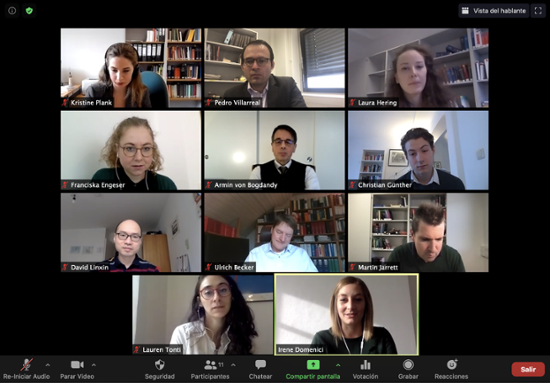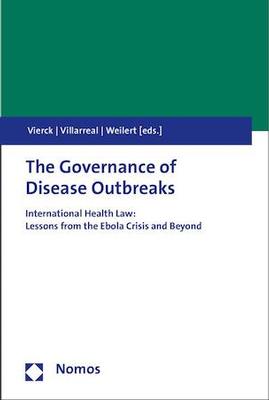Sie befinden sich hier: Forschung Forschung nach Rechtsgebieten Völkerrecht International Public Authority International Health Governance
The Forschungstätte der Evangelischen Studiengemeinschaft e.V. / Institute for Interdisciplinary Research (FEST) and the Max Planck Institute for Comparative Public Law and International Law are engaged in a research project on International Health Governance (IHG). Its goal is to apply the International Public Authority (IPA) approach in order to characterize and explain IHG in the face of ongoing structural changes in public international law.
This IHG perspective purports to recognize the relevant actors involved in the goal of providing an adequate standard of health for persons. While the international human right to health still focuses on states and their obligation of guaranteeing minimum standards, IHG encompasses a broader picture of states alongside international organizations, NGOs, private actors and public-private partnerships (PPP's), all of them acting within the purview of legal norms as well as under ethical convictions. Consequently, this research deals with the following questions: What are the responsibilities of IHG actors and how does law coordinate their actions? How does the human right to health address the intertwined features with other fields such as environmental law? With the ultimate goal of delivering timely and effective responses to health hazards requiring an international coordination, the interplay between the regulatory frameworks and their structural shortcomings merits closer scrutiny.

On Friday, 11 December 2020, the online workshop "The Fragmented Nature of Pandemic Decision-Making: Comparative and Multi-Level Legal Analysis" took place under the auspices of the Max Planck Institute for Social Law and Social Policy (Munich) and of the Max Planck Institute for Comparative Public Law and International Law (Heidelberg), both from the Max Planck Society in Germany. The event was sponsored by Max Planck Law as an initiative to bring together the work of multiple research institutes in areas where there is a natural thematic overlap.
After introductory words by the Directors, Professors Ulrich Becker and Armin von Bogdandy respectively, researchers from both institutes exchanged perspectives related to their ongoing work focused on the COVID-19 crisis. Seven presentations were held, each followed by immediate feedback from the Directors and the participating researchers, all of whom gave insightful ideas on how to further develop each topic.
As a result of the workshop, and thanks to the support of Max Planck Law, Irene Domenici and Pedro A. Villarreal jointly edited a special issue at the European Journal of Health Law, entitled: "The Fragmented Nature of Pandemic Decision-making: A Comparative and Multilevel Legal Analysis" and published in March, 2022.
Pedro A. Villarreal has joined the editorial team of Lex-Atlas: Covid-19. A global academic project mapping legal responses to Covid-19. It was launched in the fall 2020 and will provide a scholarly analysis of national legal responses to Covid-19 around the world. Updated across 2021, the editors are working with Oxford University Press to publish the first set of Country Reports in February 2021. It is the product of a vast collaboration of legal experts from across the world, led by University College London, King’s College London, the Max Planck Institute of Comparative Public Law and International Law in Heidelberg, Germany. It is generously supported by the UK’s Arts and Humanities Research Council.
The project is motivated by the need for a comprehensive overview of national legal responses to Covid-19. The pandemic has many facets, and national responses have varied considerably. Quite apart from epidemiological performance, countries have employed emergency powers differently, have had different kinds of institutional disruption, diverged in public health measures, and have had variable social policy coverage and responses to the human rights needs of vulnerable groups. A scholarly overview of these legal responses is required both to assess past political choices and to prepare for future pandemics. Cataloguing them in detail will also be an important contribution to the history of the pandemic. However, the complexity and fluid nature of the subject-matter essentially requires an unconventional scholarly approach. To make the international comparisons valuable, it requires a high degree of coordination between distinguished national legal experts, a large editorial team applying a consistent methodology, and the capacity to change national portraits as the law and policy shifts in line with the evolution of the pandemic.
The project seeks to meet this need through a world-wide collaboration between legal scholars. The project’s core deliverable is the Oxford Compendium of National Legal Responses to Covid-19, available open access and published in April, 2021. Besides the Compendium, a Database and a Final Report covering best and worst practices in the views of the project’s Editorial Committee will be prepared. All of the project´s output will be open-access and data will be held open-source. The project portal and further details are available on www.lexatlas-c19.org
The Contested Authority of International Institutions in Global Health: National Decouplings, Regional Stumbling Blocks and International Collisions
On 13-14 November, 2019, an international workshop took place in Heidelberg, Germany. Professor Till Bärnighausen (Heidelberg Institute of Global Health) provided a keynote speech.
The event provided a forum for discussing how the role of international institutions in the promotion of health can be appraised in multiple levels:
1) At the general international, i.e. multilateral level, interinstitutional links can be identified. Whereas such links can lead to synergies, they may also give way to tensions between institutions, as well as with non-state actors.
2) In turn, at the regional level, governance structures related to health may also be identified. This raises the question of whether and how the formation of regional blocs or groupings of countries may lead to a "health regionalism". Moreover, the discussions may also hinge upon issues of how the relationship between the multilateral and the regional levels is to be understood. Are they "stepping stones" or "stumbling blocks"?
3) Lastly, the development of health-related structures at the national level is closely linked to the international promotion of health. On one hand, limited resources may lead to undermining the goals set out by international institutions in the field of health. On the other hand, national political processes in highly-developed economies may undermine the work of international institutions.
A summary of the outcome of the workshop, including an overview of individual multiple presentations, is available below. A future publication of the results is underway.
WORKSHOP: HEALTH AND THE ENVIRONMENT IN INTERNATIONAL LAW
Under the aegis of the International Health Governance (IHG) project, the workshop entitled Health and the Environment in International Law - Actors, Norms and Responsibilities, took place on 17-18 October, 2018, at the Max Planck Institute for Comparative Public Law and International Law. The programme is available here.
This workshop explored the contribution of international law, in both fields of health law and environmental law, to the prevention of known and emerging environmental risks to public health. In line with the objectives of the IHG project, the debate will also focus on the identification of major actors and relevant responsibilities within the framework of global health and environmental governance.
The workshop addressed the legal aspects of the intersections between health and the environment with regards to climate change, biodiversity, pollution of air and water, food regulation and intersections with human rights law. A total of sixteen presenters took part in the event.
Daniel Klein (United Nations Climate Change Secretariat) provided a keynote speech with regards to the emerging regime under the Paris Agreement and its architecture. He also gave an overview of some of the emerging linkages between the climate change regime and international health governance, particularly in light of the Conference of the Parties in Katowice, Poland, in December, 2018.

As a result of the Workshop, which took place at the Max Planck Institute for Comparative Public Law and International Law in March, 2016, the book The Governance of Disease Outbreaks - International Health Law: Lessons from the Ebola Crisis and Beyond (edited by Leonie Vierck, Pedro Villarreal and Katarina Weilert), has been published with Nomos (2017). The publication has been possible thanks to a collaboration between the Forschungstätte der Evangelischen Studiengemeinschaft e.V. / Institute for Interdisciplinary Research (FEST) and the Max Planck Institute for Comparative Public Law and International Law, also with support from the Frankfurt Normative Orders Cluster and the Bundesministerium für Gesundheit/Federal Ministry of Health of Germany (BMG).
This edited volume is directed at experts in international law, practitioners in international institutions, and other experts who would like to familiarize themselves with the legal framework of infectious disease governance. Using the West African Ebola crisis of 2014 as a case study, this book is part of a larger collaborative project on international health governance.
As there is a persistent risk of the occurrence of infectious disease epidemics and pandemics, it is all the more important to frame the underlying mechanisms, legal and otherwise, to deal with such problems. The aim of the book is thus to critically contribute to the ongoing debates related to instruments such as the International Health Regulations, as well as the role of international organizations such as the World Health Organization.
Against this backdrop, the authors explain the context and substantive legal framework of the Ebola crisis, while also highlighting its human rights aspects, institutional law (such as the debate on the securitization of health) and the limits to a purely legal approach to the subject. Thus, the authors herein come from various backgrounds such as law, public health, political science and anthropology.
The book is available open access here.
Please find a long concept paper for our IHG project here as well as the documents of our initial workshop in March 2016.